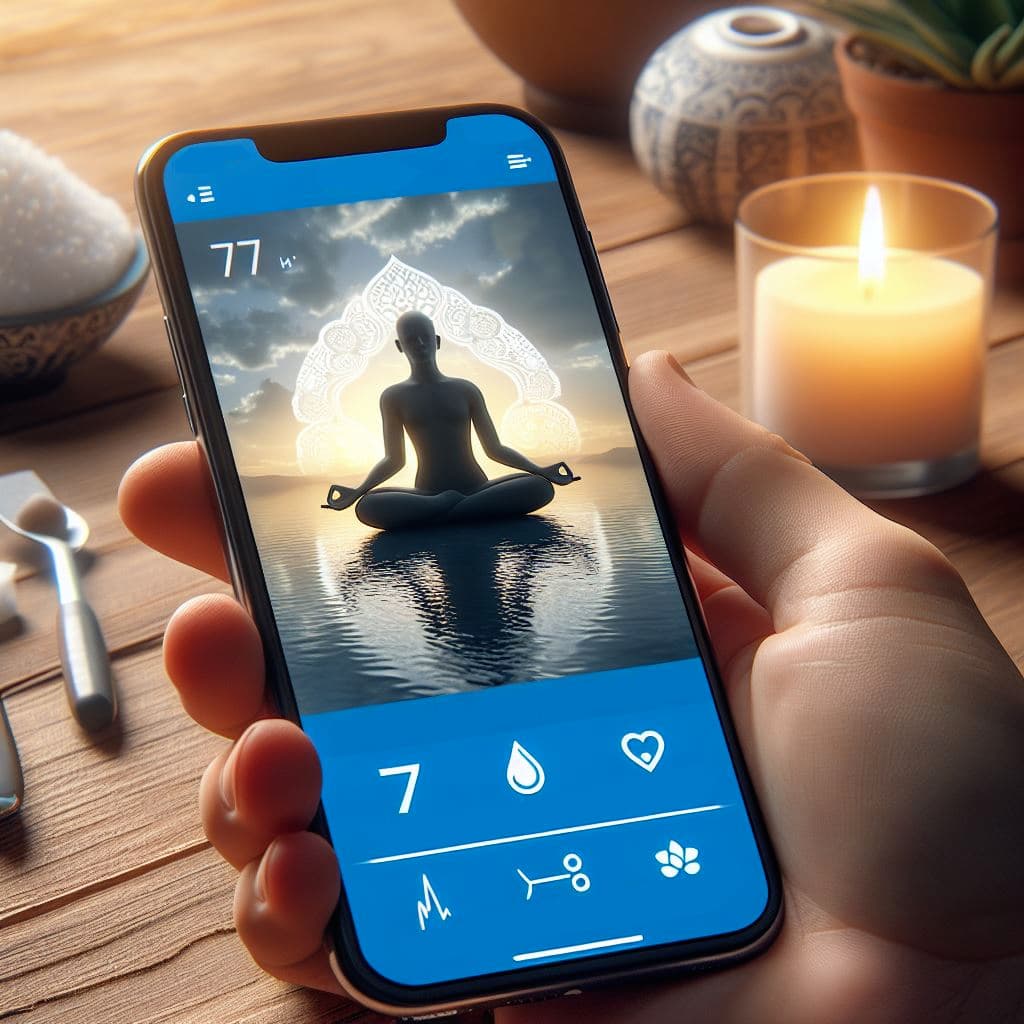In the digital age, managing diabetes has transcended traditional methods, incorporating technology to make daily monitoring less of a chore and more of a seamless part of life.
One innovative approach combines blood sugar tracking with mindfulness and meditation through specialized apps. This integration not only aids in managing physical aspects of diabetes but also addresses the mental and emotional strains, offering a holistic approach to diabetes care.
Benefits of Mindful Monitoring
Holistic Health Management
Incorporating meditation into diabetes management apps encourages a holistic approach to health. By addressing both the physical and emotional challenges of diabetes, individuals can achieve better overall health outcomes.
- Reduction in stress-induced hyperglycemia
- Improved mental health and resilience
- Enhanced self-awareness and mindfulness in daily activities
Improved Diabetes Control
The mindful approach to diabetes management has shown promise in improving blood sugar control and enhancing the effectiveness of traditional diabetes treatments.
- Better engagement with health goals
- Increased motivation for physical activity
- Improved dietary choices through mindful eating practices
The Synergy of Blood Sugar Tracking and Meditation
The integration of blood sugar tracking and meditation within a single app represents an innovative approach to diabetes management, one that acknowledges the intricate interplay between mental and physical health. This synergy not only simplifies the daily routine of individuals managing diabetes but also amplifies the benefits of each practice, providing a comprehensive care strategy that addresses the condition holistically.
Meditation, with its profound capacity to mitigate stress, plays a crucial role in this integrated approach. Chronic stress is a well-documented factor that can exacerbate blood glucose fluctuations, making stress management an essential, yet often overlooked, component of diabetes care. Through meditation, individuals can engage in practices that lower stress hormone levels, leading to more stable glucose readings. This effect is particularly beneficial for those with diabetes, as it provides a non-pharmacological method to complement traditional glucose management strategies.
Furthermore, the practice of mindfulness—cultivated through regular meditation—significantly enhances one’s adherence to diabetes care plans. Mindfulness encourages a moment-to-moment awareness and acceptance of one’s thoughts, feelings, and bodily sensations, fostering a heightened sense of self-awareness. This increased awareness can lead to more mindful choices regarding diet, physical activity, and medication adherence, directly influencing one’s ability to manage diabetes effectively. For instance, mindful eating practices can help individuals recognize satiety cues and choose foods that support blood sugar stabilization.
Selecting the Right App for You
Selecting the ideal app to manage diabetes while incorporating mindfulness practices into your routine is a decision that hinges on several key considerations. The goal is to find an app that not only simplifies the monitoring of your diabetes but also enhances your ability to maintain mental well-being through mindfulness. This dual approach can significantly improve your quality of life, making it crucial to choose an app that aligns with your specific needs and preferences.
A user-friendly interface is paramount. The app should present information in a clear, accessible manner, minimizing confusion and making it easy for you to log your data, view your history, and understand your blood glucose patterns at a glance. Navigating the app should feel intuitive, ensuring that tracking your health metrics becomes a seamless part of your daily routine rather than a cumbersome task. This ease of use extends to the mindfulness components of the app as well, which should offer a straightforward way to access meditation sessions, mindfulness exercises, and educational content without overwhelming users.
Customizable reminders serve as another critical feature. The ability to set personalized reminders for blood glucose checks and meditation sessions can significantly enhance your management of diabetes and mental health. These reminders help establish a consistent routine, ensuring you’re actively engaging with both the physical and mental aspects of your health care plan. Customization is key here, as it allows you to tailor the reminders to fit your schedule, making it more likely that you’ll adhere to your diabetes care plan and regular mindfulness practice.
| App Feature | Description | Benefit for Diabetes Management |
|---|---|---|
| Real-time Glucose Monitoring | Allows for continuous tracking of blood sugar levels. | Enables timely adjustments to diet and medication. |
| Guided Meditation Sessions | Offers meditation sessions designed to reduce stress. | Helps mitigate stress-related blood sugar spikes. |
| Dietary Tracking | Includes tools for logging meals and nutritional intake. | Supports mindful eating and better glycemic control. |
| Activity Logging | Enables recording of physical activity and its impact on glucose levels. | Encourages a more active lifestyle and aids in weight management. |
| Customizable Reminders | Sends notifications for blood glucose checks and meditation practice. | Improves adherence to diabetes care and mindfulness routines. |
Integrating Mindful Practices into Your Diabetes Care Routine
Integrating mindful practices into your diabetes care routine through the use of a management app represents a transformative step towards holistic health. This integration not only enhances the precision and efficiency of monitoring your diabetes but also introduces a serene balance to your daily life, fostering both physical wellness and mental tranquility. The journey towards incorporating these practices into your routine should begin with modest, manageable steps, gradually evolving into a comprehensive habit that nurtures your overall health.
Beginning with regular blood sugar logging is foundational. This practice establishes a baseline understanding of your body’s responses to different foods, activities, and stress levels. By consistently tracking your blood glucose, you can identify patterns and triggers, empowering you with the knowledge to make informed decisions about your diet, exercise, and medication. This data-driven approach demystifies the complexities of managing diabetes, making the condition more manageable.
Simultaneously, introducing short meditation sessions into your routine can significantly amplify the benefits of your diabetes management plan. Meditation, especially when tailored for mindfulness, encourages a deep connection with the present moment, allowing you to observe your thoughts and feelings without judgment. These moments of introspection provide a mental respite from the constant calculations and concerns associated with diabetes, reducing stress and enhancing emotional well-being.
Gradually building this habit is key to its success. Start with just a few minutes of meditation each day, perhaps immediately after checking your blood sugar, to create a seamless connection between the two activities. This pairing not only reinforces the habit of logging your glucose levels but also ensures that you regularly dedicate time to mindfulness, integrating it as a natural component of your diabetes care.
As you become more comfortable with these practices, you can slowly extend the duration of your meditation sessions and explore additional mindful exercises, such as mindful eating or body scans, further enriching your routine. These practices encourage you to be fully present and engaged with every aspect of your diabetes management, from monitoring your blood sugar to making mindful choices about nutrition and activity.
Integrating mindful practices into your diabetes care routine through an app effectively bridges the gap between physical health monitoring and mental wellness
Apps for Tracking Blood Sugar with Meditation: Your FAQs Answered
What are the main benefits of using an app that combines blood sugar tracking with meditation?
These apps offer a holistic approach to diabetes management by helping you monitor your physical health while also reducing stress, which can impact blood sugar levels.
How can meditation help with diabetes management?
Meditation can lower stress levels, reducing the risk of stress-induced hyperglycemia and promoting overall well-being, which is essential for effective diabetes care.
Are these apps suitable for all types of diabetes?
Yes, these apps can be beneficial for both type 1 and type 2 diabetes, as they address universal aspects of diabetes management such as blood sugar monitoring, stress reduction, and lifestyle adjustments.
Do I need any special equipment to use these apps?
Most apps do not require special equipment beyond a compatible smartphone. Some features, like real-time glucose monitoring, may integrate with specific glucose meters or continuous glucose monitors (CGMs).
Can these apps replace my current diabetes management plan?
While these apps are valuable tools, they should complement, not replace, the guidance of healthcare professionals and any established diabetes management plans.
How often should I meditate using the app to see benefits?
Regular practice is key. Even short, daily meditation sessions can yield significant benefits in stress reduction and mental well-being.
Are the dietary tracking features in these apps tailored for diabetes?
Many apps offer dietary tracking features designed with diabetes in mind, allowing you to log meals, monitor carbohydrate intake, and track how your diet affects your blood sugar levels.
How do I choose the right app for my needs?
Consider features that align with your lifestyle and diabetes management goals, such as the ease of glucose monitoring, the variety of meditation sessions offered, and any integrations with existing diabetes care devices.
Can using these apps improve my sleep?
Yes, meditation and stress reduction can contribute to better sleep quality, which is beneficial for managing diabetes.
Where can I find these apps?
These apps are available on various platforms, including the Apple App Store and Google Play Store. Look for apps with high ratings and reviews from other users with diabetes.
Citations
- Rosenzweig, S., Greeson, J. M., Reibel, D. K., Green, J. S., Jasser, S. A., & Beasley, D. (2010). “Mindfulness-based stress reduction for stress management in healthy people: A review and meta-analysis.” Journal of Alternative and Complementary Medicine, 15(5), 593-600. This meta-analysis evaluates the effectiveness of Mindfulness-Based Stress Reduction (MBSR) programs across various populations, demonstrating significant improvements in stress reduction that could benefit individuals with diabetes.
- Fjorback, L. O., Arendt, M., Ornbøl, E., Fink, P., & Walach, H. (2011). “Mindfulness-based stress reduction and mindfulness-based cognitive therapy – a systematic review of randomized controlled trials.” Acta Psychiatrica Scandinavica, 124(2), 102-119. This review assesses the efficacy of MBSR and Mindfulness-Based Cognitive Therapy (MBCT) in treating various conditions, including the potential implications for diabetes management through stress and anxiety reduction.
- Tang, Y. Y., Ma, Y., Wang, J., Fan, Y., Feng, S., Lu, Q., Yu, Q., Sui, D., Rothbart, M. K., Fan, M., & Posner, M. I. (2007). “Short-term meditation training improves attention and self-regulation.” Proceedings of the National Academy of Sciences, 104(43), 17152-17156. This study demonstrates how brief meditation training can enhance cognitive functions and self-regulation, which are beneficial for managing chronic conditions like diabetes.
- Gregg, J. A., Callaghan, G. M., Hayes, S. C., & Glenn-Lawson, J. L. (2007). “Improving diabetes self-management through acceptance, mindfulness, and values: A randomized controlled trial.” Journal of Consulting and Clinical Psychology, 75(2), 336-343. This randomized controlled trial explores the impact of a program integrating acceptance and commitment therapy (ACT) with mindfulness on diabetes self-management, highlighting significant improvements in self-care activities and glycemic control.
- Youngwanichsetha, S., Phumdoung, S., & Ingkathawornwong, T. (2014). “The effects of mindfulness eating and yoga exercise on blood glucose levels of pregnant women with gestational diabetes mellitus: A randomized controlled trial.” Applied Nursing Research, 27(4), 227-230. This study investigates the effects of mindful eating and yoga on blood glucose levels in pregnant women with gestational diabetes, offering evidence of mindfulness practices’ benefits in managing glucose levels.






